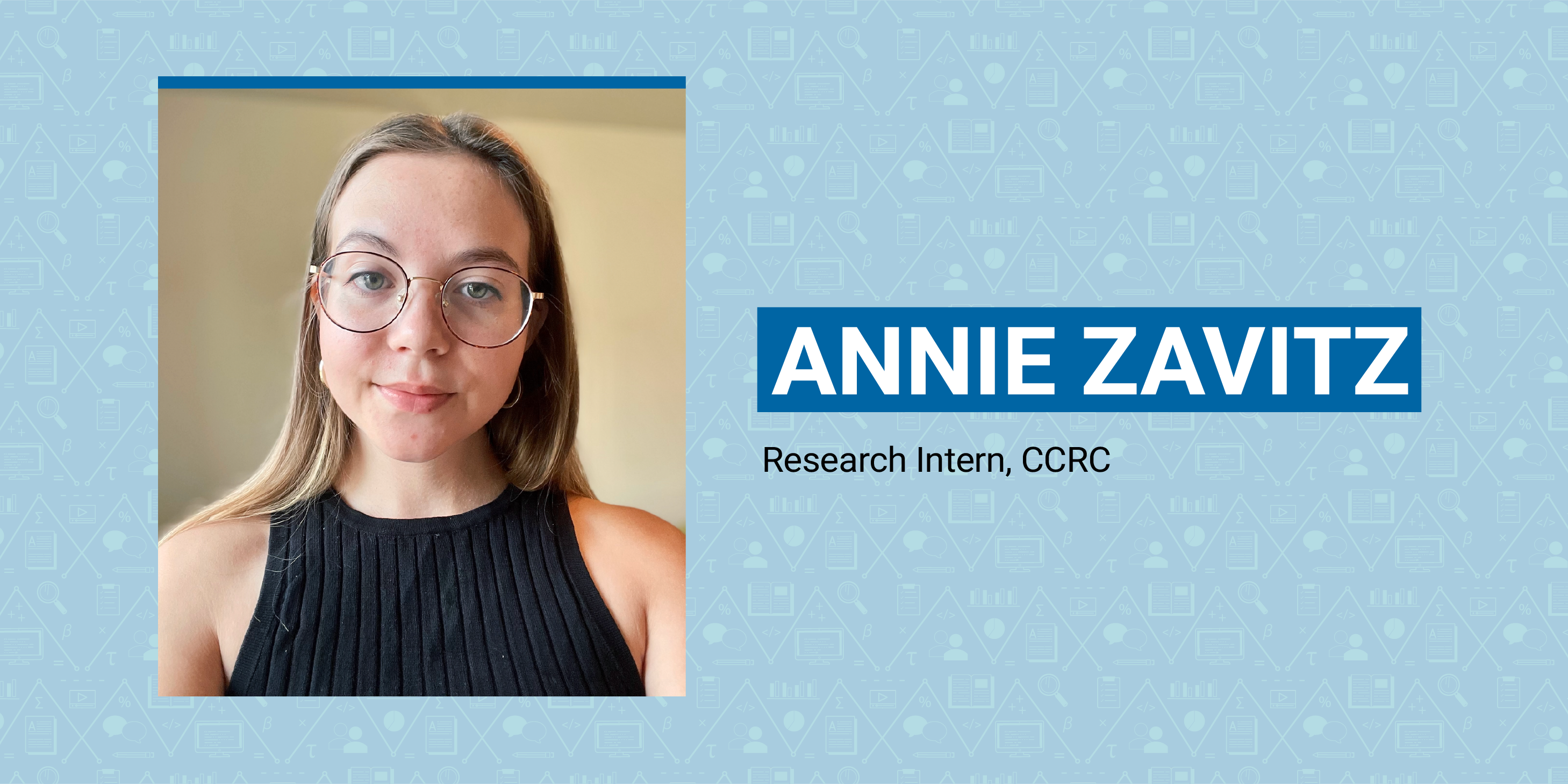Annie Zavitz is a rising senior at Barnard College, where she studies English. She is interning this summer with CCRC’s guided pathways team, assisting with research on the rural colleges participating in the center’s summer institute. In this Q&A, find out more about Zavitz, her internship experience, and her newfound appreciation for guided pathways.
This Q&A was condensed and edited.
Laila Dola: Tell me about yourself. What do you study?
Annie Zavitz: I am majoring in English at Barnard College and concentrating in American literature. I am also minoring in education studies.
This fall I will be a senior, so right now I am thinking that after I graduate I will continue to do some form of teaching or advising high school students with their college applications. I plan on working with kids in some way.
Dola: Tell me about what interests you about higher education.
Zavitz: My interest in higher education started because I had a difficult time applying to college. I grew up always assuming that I’d go to college. But when it was time to apply, no one in my family knew what to do or how to help me. We couldn’t afford SAT tutors or college advisors. And I went to a somewhat rural high school, so there were very few counselors available and their main focus was getting everybody to college. So I didn’t get enough support.
I remember I went to them asking for help with applying to some colleges, but because they weren’t the local ones the counselors already had connections with, they were kind of like “you’re on your own.” Once I got to college, I joined a nonprofit organization that allows college students to help high school students apply to college. I thought it was a perfect opportunity because I can help students who have a similar situation to mine. After that, I began taking classes in education to better my work in advising these students. It all made me realize that higher education is something everybody should have access to if they want it; they should be able to just go. And I want to help as much as possible.
Dola: What are some things you are doing as an intern in the guided pathways team?
Zavitz: One of the things I do is take notes during the summer institute. When the discussions within and between college teams are happening, I observe and take notes on the concerns that they bring up. Because all the colleges in the institute self-identify as rural, I take notes about additional challenges of being in a rural school. These notes will eventually inform a research agenda around rural community colleges. Another main project that I am working on is creating a literature review or annotated bibliography about research literature that already exists about rural community colleges.
Dola: What can you tell us about the summer institute?
Zavitz: The summer institute is meant to teach participating teams from community colleges about ways they can study themselves and use their findings to improve their own programs of study, and also implement the guided pathways model. It’s also meant to model how they can teach it to the rest of the people at their colleges. At the very end of the institute, each college presents a “TED-style” presentation that they could give to present guided pathways or their own research to the rest of the people at their school.
Dola: What are your thoughts on general education and the guided pathways model?
Zavitz: Whenever I have taken a general education course, I didn’t mind it. But when I look back at my grades, those are lower than the grades for classes that I’ve actually enjoyed. One thing that I’ve learned from the institute is the idea of “light-the-fire” courses. These are courses that get students excited about learning. The colleges sometimes react by saying “we’re not bad teachers so why do we need to change what we’re doing?” or “now we need to add and take away so many courses and that’s a logistical nightmare.” But I learned from the team’s response to hesitation and confusion that if your teachers are excited about their subject, then any course can be “light-the-fire course,” even general education courses.
I think guided pathways is presenting an opportunity to reimagine things that already exist without overwhelming the colleges. Obviously, a lot of work is required to implement guided pathways; it takes several years. But there are ways to reimagine things that already exist to make it easier for everybody.
Dola: What are your hopes for the future of community colleges and our education system in general?
Zavitz: My hope is that it gets more funding. I know that a stigma around going to community colleges exists in many places, but community colleges are a useful tool that I hope get taken more seriously and get recognized as that valuable asset. As for higher education in general, I hope it’s more accessible in the future. One thing that I have been thinking a lot about is how very elite institutions have first-generation, low-income students who are able to get the support they need. And there’s a lot of talk about admitting more of those students to elite institutions so that they have that support, which is a good thing. But I wonder why we don’t give these resources to where those students already are: community colleges. They shouldn’t have to attend elite colleges in order to have access to these support systems and resources.





